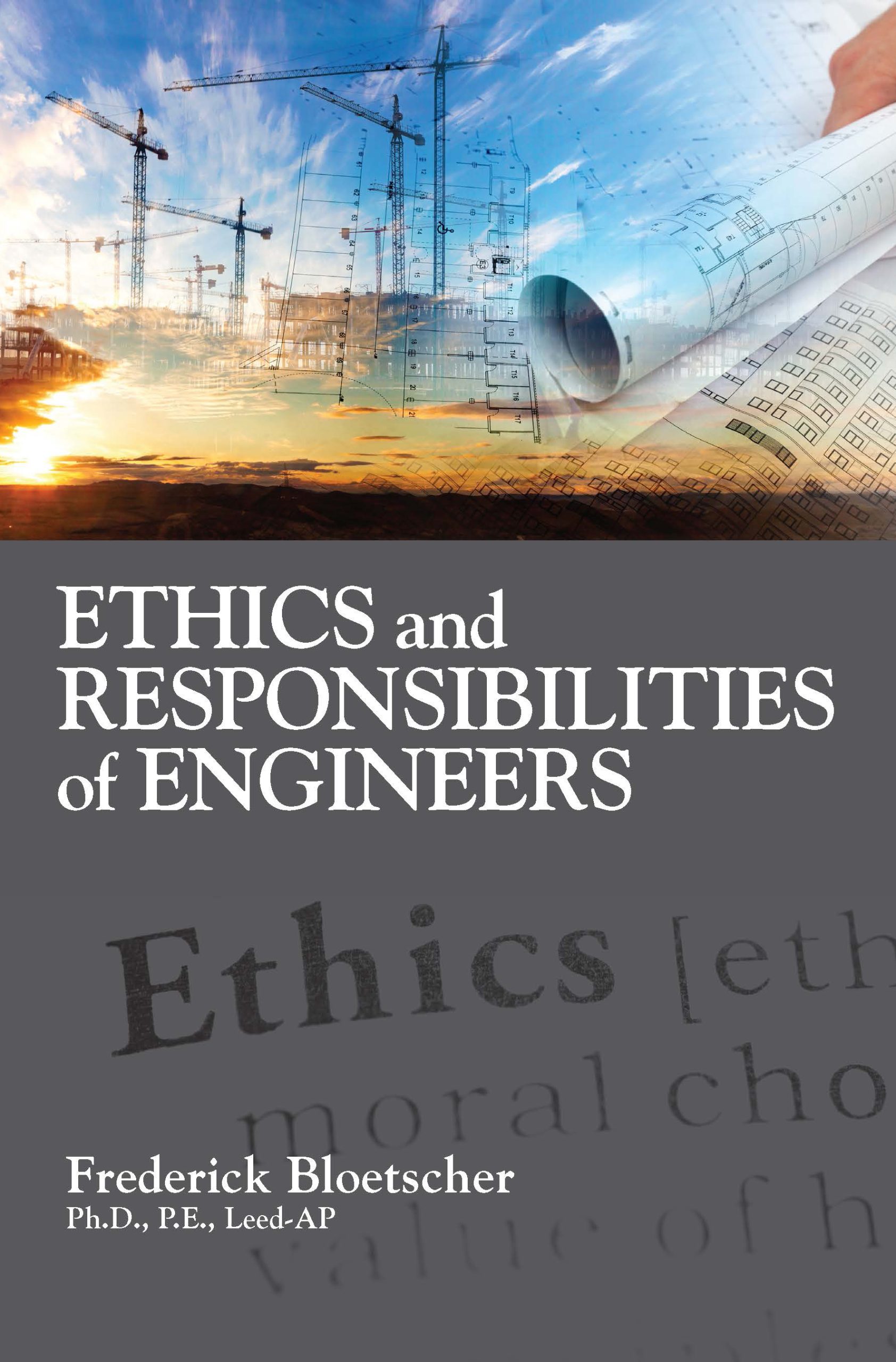Ethics and Responsibilities of Engineers
$44.95
Frederick Bloetscher, Ph.D., P.E., Leed-AP
Softcover, 6×9, 280 pages
ISBN: 978-1-60427-184-3
December 2021
Description
In today’s increasingly competitive business world, engineers are continually faced with ethical questions that balance the needs of clients with those of society as a whole. With the dynamic nature of technological growth, the ethical challenges become more and more difficult to quantify and the potential for unintended and unwanted consequences increases exponentially. Individual profits and public service do not often align, hence the need for a code of ethics.
Ethics and Responsibilities of Engineers is designed to help students and new practitioners understand from where ethics originate and how they have developed in the profession. It is written to help engineers understand how the coursework they take in school aligns with the public good. What separates this book from others is the focus on the historical development of ethics for the profession and the role played by our educational system, accreditation commissions, and licensing boards. The knowledge and regulatory basis for the engineering occupation permits engineers to comprehend and address (and thereby often avoid) the challenges that might compromise the image of engineers in society. The trust that the public has in their judgment to protect and serve society is what allows engineers to be held in high esteem.
About the author(s)
Frederick Bloetscher, Ph.D., is currently a Professor of Civil, Environmental & Geomatics Engineering and Associate Dean for Undergraduate Studies and Community Outreach at Florida Atlantic University in Boca Raton, Florida. His research focus has been on urban infrastructure systems, particularly public water, stormwater, and sewer systems and their sustainability. Dr. Bloetscher teaches the capstone senior design sequence at FAU, plus classes in water/wastewater, construction, environmental engineering and modeling, hydraulics, and infrastructure management. He is also the author of Practical Concepts for Capstone Design Engineering and Public Infrastructure Management.
Dr. Bloetscher received his bachelor’s degree in civil engineering from the University of Cincinnati and earned his Master of Public Administration Degree from the University of North Carolina at Chapel Hill. His Ph.D. is in civil, environmental, and architectural engineering from the University of Miami. His experience prior to academia is helpful to his ongoing research and outreach efforts. He was a city manager for two communities in North Carolina that were undergoing significant infrastructure improvements. In Florida, he was a utility director and deputy director for several large water and sewer systems that included groundwater, aquifer storage, reclaimed water systems, wastewater plants, and miles of piping that needed to be maintained.
Dr. Bloetscher has many years of consulting experience as well. He is the President of Public Utility Management and Planning Services, Inc. (PUMPS), a company dedicated to the evaluation of utility systems, needs assessments, condition assessments, strategic planning, capital improvement planning, grant and loan acquisition, inter-local agreement recommendations, bond document preparation, consultant coordination, permitting, and implementation of capital improvement construction. In managing both large and small infrastructure systems, and consulting for local governments, he has been involved in the construction of over $500 million in improvements—both new for expansion and for replacement.
Dr. Bloetscher has volunteered his time for many professional associations. He is the former Chair for the Water Resource Division Trustees, 3-time Chair of the Groundwater Resource Committee, and a member of the aquifer storage and recovery sub-committee and the Education Committee for the American Water Works Association (AWWA). Currently, Dr. Bloetscher is the chair of the distribution engineering and construction committee for AWWA and a former member of AWWA’s Technical and Education Council. He is the Secretary for the Florida Section of AWWA and has been the technical program chair since 2004. He is a LEED-AP and holds professional engineering licenses in nine states, and operations licenses in water, wastewater, distribution, and collection systems. He has had a North Carolina General Contractor’s license for pipeline and small utility construction for over 20 years.
Dr. Bloetscher has been nominated for the “Distinguished Teacher of the Year” award a number of times by his students at FAU and has received three university-wide leadership awards including the prestigious “Presidential Award for Community Engagement” in 2018, received several national awards including the “Distinguished Educator Award” from the National Engineers Council in 2017, and has been recognized by the AWWA, the National Engineer’s Council, Florida Section of AWWA, and local chapters of ASCE for his contributions to the industry. In 2012, Dr. Bloetscher received the “National Council of Examiners for Engineering and Surveying Award for Connecting Professional Practice and Education” for his work on the Dania Beach Nanofiltration Facility, which is the first LEED-Gold water treatment facility in the world. Dr. Bloetscher was the LEED administrator for the project.
Dr. Bloetscher can be contacted via email at h2o_man@bellsouth.net. His website is www.h2o-pe.com and his blog is at publicutilitymanagment.com on WordPress.
Table of Contents
Chapter 1: The Profession and Ethical Conduct
Learning Objectives
1.1 What Engineers Do
1.1.1 Engineers in History
1.2 Engineering Ethics
1.3 Summary
References
Problems
Chapter 2: From Where Do Ethics Evolve?
Learning Objectives
2.1 A Brief History of the Development of Ethics
2.2 The Philosophers’ Pontificate
2.3 Creeds, Codes, and Canons
2.4 Summary
References
Problems
Chapter 3: States and Licensure
Learning Objectives
3.1 Licensure
3.2 Rules Guiding Engineers
3.3 Failing to Do Your Job
3.3 Case Studies
3.3.1 Continuing Education
3.3.2 Licensure
3.3.3 Failure to Seal Correctly
3.3.4 Plan Stamping and Letting Someone Use Your Seal
3.3.5 Practicing in Your Area of Competence
3.3.6 Construction Observation
3.3.7 Safety
3.3.8 Negligence—The Failure to Follow Codes
3.4 The MORAL of the Story
3.5 Summary
References
Problems
Chapter 4: Fundamental Education Competency
Learning Objectives
4.1 Accreditation
4.2 Education
4.3 Teaching Ethics in College
4.4. Summary
References
Problems
Chapter 5: Working as an Engineer
Learning Objectives
5.1 What Clients Seek in the Selection of Engineers
5.1.1 What Clients (Should) Seek from Consulting Engineers
5.1.2 What Consultants Do Not Need
5.2 The Proposal Process
5.2.1 Scope of the Project
5.2.2 Requirements of Proposers
5.2.3 Evaluation of Proposals
5.3 Negotiation of Contracts
5.4 Working As an Engineer
5.5 Stages in the Design and Fabrication Process
5.5.1 Documentation and Reports
5.5.2 Failure to Write TMs and Basis of Design Reports
5.6 Summary
References
Problems
Chapter 6: Organizing for Work
Learning Objectives
6.1 Types of Organizations
6.2 Ongoing Operations of a Firm
6.3 Summary
Problems
Chapter 7: Examples of Ethical Conundrums for Engineers
Learning Objectives
7.1 The Challenges of the Engineer’s Creed
7.2 Agents of Social Change Means Social Responsibility
7.2.1 Social Responsibility
7.3 More Complicated Issues
7.3.1 Fixed Budget Challenge
7.3.2 Changing the Design
7.3.3 Product Liability
7.4 Lobbying/Disparaging Comments
7.5 The Groundwater Conundrum
7.5.1 Klamath River Basin
7.6 Risk Assessment: Is Fracking Desirable?
7.7 Artificial Intelligence (AI)
7.8 Contributing to Politicians
7.9 Summary
References
Chapter 8: Economics and Engineering—The Need for Leadership
Learning Objectives
8.1 Defining Leadership
8.2 Results of an Engineering Survey on Leadership
8.3 Conclusions
References
Chapter 9: Conclusions
References
Appendix A – NSPE Code of Ethics
Appendix B – ASCE Code of Ethics
Index
Key Features
- Presents the origins of ethical responsibility for engineers and how ethics have developed in the profession over centuries
- Explores why engineers must operate under a specific code of ethics that recognizes the obligation to protect and serve the public first and foremost
- Discusses the ethics behind how to balance the needs of the client with the needs of society at large
- Outlines how education in the classroom, and experience post classroom, are required to provide tools for licensure and the legal responsibilities that accompany licensure
- Includes actual case studies from licensing boards across the United States
- Offers valuable insight and preparation for civil and construction engineering professional practice
- WAV contains a variety of professor materials (chapter slides, assignments, and the answers to many end-of-chapter questions in the book) suitable for classroom instruction—available from the Web Added ValueTM Download Resource Center
Reviews
“Not only does Ethics and Responsibilities of Engineers address its title topics, but it also serves as a compelling testament to the field itself. While the writing style is accessible to emerging engineers, the oftentimes nuanced subject matter is critical to all engineers.”
—William Schnabel, P.E., PhD, Dean, University of Alaska Fairbanks College of Engineering and Mines
“Dr. Bloetscher’s book provides the engineering community with an awareness of the complex ethical challenges facing today’s engineers. Written with a focus on young professionals, it presents a clear vision with a historical perspective of the Code of Ethics applied to engineers for maintaining public trust and confidence. I highly recommend reading and sharing this publication with your fellow practitioners.”
—Albert Muniz, P.E., Vice President, Hazen and Sawyer
You may also like…
Related products
-

Laboratory Testing of Soils, Rocks and Aggregates
Retail Price: $89.95$79.95 Add to cart -

Theoretical Foundation Engineering
Retail Price: $59.95$49.95 Add to cart -

Geotechnical Engineering Handbook
Retail Price: $129.95$109.95 Add to cart -

Deepwater Foundations and Pipeline Geomechanics
Retail Price: $139.95$129.95 Add to cart -

Plasticity in Reinforced Concrete
Retail Price: $59.95$49.95 Add to cart



